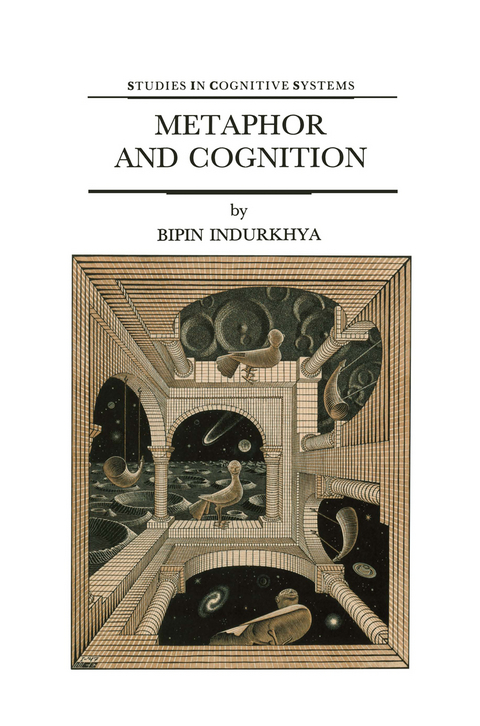
Metaphor and Cognition
An Interactionist Approach
Seiten
2010
|
Softcover reprint of hardcover 1st ed. 1992
Springer (Verlag)
978-90-481-4146-3 (ISBN)
Springer (Verlag)
978-90-481-4146-3 (ISBN)
Many metaphors go beyond pionting to the existing similarities between two objects -- they create the similarities.
A comprehensive theory of metaphor is proposed in this framework that explains how metaphors can create similarities, and why such metaphors are an invaluable asset to cognition.
Many metaphors go beyond pionting to the existing similarities between two objects -- they create the similarities. Such metaphors, which have been relegated to the back seat in most of the cognitive science research, are the focus of attention in this study, which addresses the creation of similarity within an elaborately laid out interactive framework of cognition. Starting from the constructivist views of Nelson Goodman and Jean Piaget, this framework resolves an apparent paradox in interactionism: how can reality not have a mind-independent ontology and structure, but still manage to constrain the possible worlds a cognitive agent can create in it?
A comprehensive theory of metaphor is proposed in this framework that explains how metaphors can create similarities, and why such metaphors are an invaluable asset to cognition. The framework is then applied to related issues of analogical reasoning, induction, and computational modeling of creative metaphors.
A comprehensive theory of metaphor is proposed in this framework that explains how metaphors can create similarities, and why such metaphors are an invaluable asset to cognition.
Many metaphors go beyond pionting to the existing similarities between two objects -- they create the similarities. Such metaphors, which have been relegated to the back seat in most of the cognitive science research, are the focus of attention in this study, which addresses the creation of similarity within an elaborately laid out interactive framework of cognition. Starting from the constructivist views of Nelson Goodman and Jean Piaget, this framework resolves an apparent paradox in interactionism: how can reality not have a mind-independent ontology and structure, but still manage to constrain the possible worlds a cognitive agent can create in it?
A comprehensive theory of metaphor is proposed in this framework that explains how metaphors can create similarities, and why such metaphors are an invaluable asset to cognition. The framework is then applied to related issues of analogical reasoning, induction, and computational modeling of creative metaphors.
Prologue.- I The Problem.- 1 Characterizing Metaphor.- 2 Enter Similarity-Creating Metaphors.- 3 Approaches to Similarity-Creating Metaphors.- 4 Cognition as Interaction.- II A Theory.- 5 An Interactionist Approach to Cognition: Informal Overview.- 6 An Interactionist Approach to Cognition: Formal Concepts.- 7 An Interaction Theory of Metaphor.- III The Implications.- 8 Some Metaphor-Related Issues.- 9 On Predictive Analogy and Induction.- 10 On Computational Approaches to Metaphor and Analogy.- Name Index.
| Reihe/Serie | Studies in Cognitive Systems ; 13 |
|---|---|
| Zusatzinfo | 1 Illustrations, color; 3 Illustrations, black and white; XVII, 457 p. 4 illus., 1 illus. in color. |
| Verlagsort | Dordrecht |
| Sprache | englisch |
| Maße | 155 x 235 mm |
| Themenwelt | Geisteswissenschaften ► Philosophie ► Sprachphilosophie |
| Geisteswissenschaften ► Psychologie ► Allgemeine Psychologie | |
| Geisteswissenschaften ► Psychologie ► Verhaltenstherapie | |
| Geisteswissenschaften ► Sprach- / Literaturwissenschaft ► Sprachwissenschaft | |
| Sozialwissenschaften | |
| ISBN-10 | 90-481-4146-X / 904814146X |
| ISBN-13 | 978-90-481-4146-3 / 9789048141463 |
| Zustand | Neuware |
| Haben Sie eine Frage zum Produkt? |
Mehr entdecken
aus dem Bereich
aus dem Bereich
Macht und Legitimität politischer Sprache im Prozess der europäischen …
Buch | Softcover (2023)
Nomos (Verlag)
74,00 €
Wie die Menschheit zu ihrer größten Erfindung kam
Buch | Softcover (2022)
C.H.Beck (Verlag)
18,00 €


